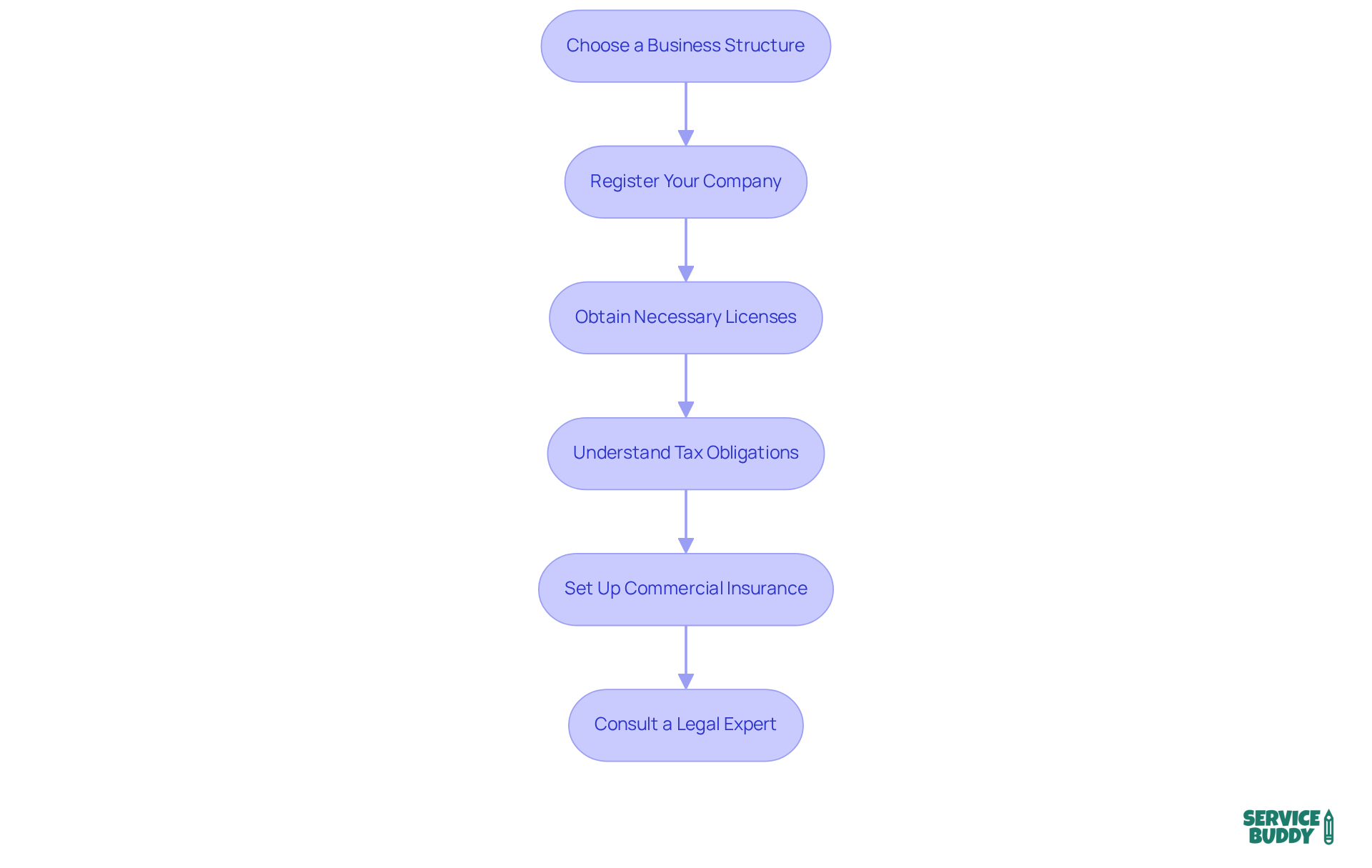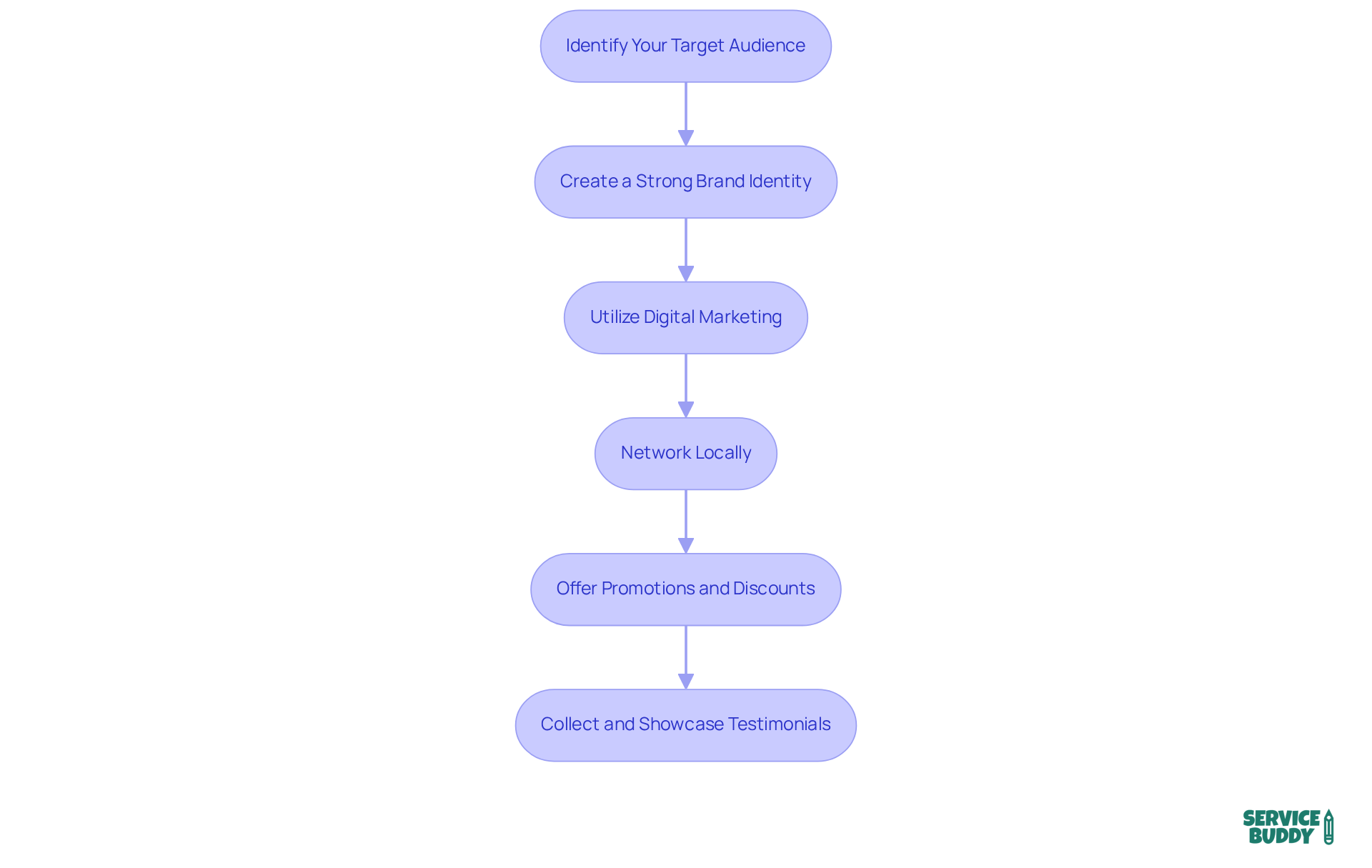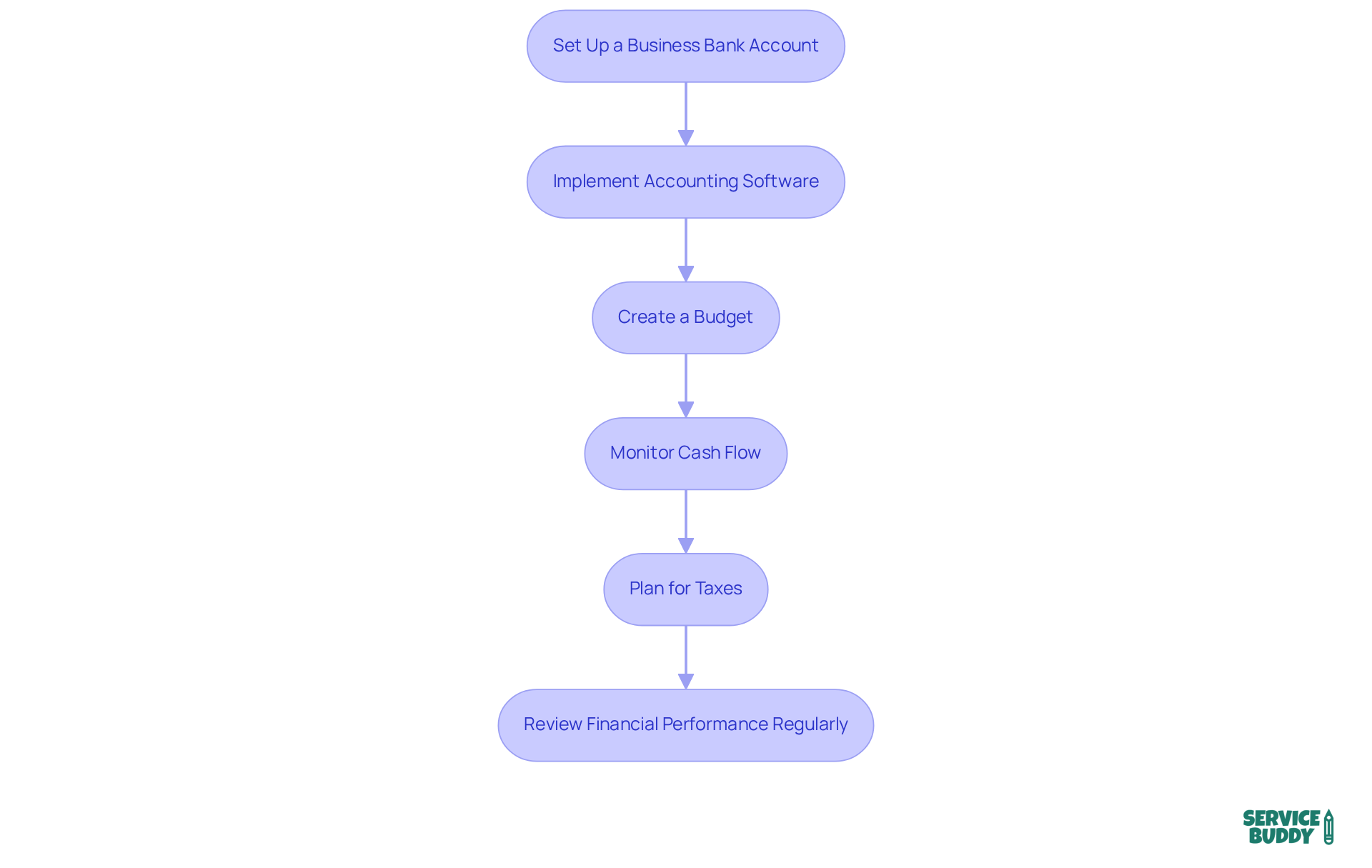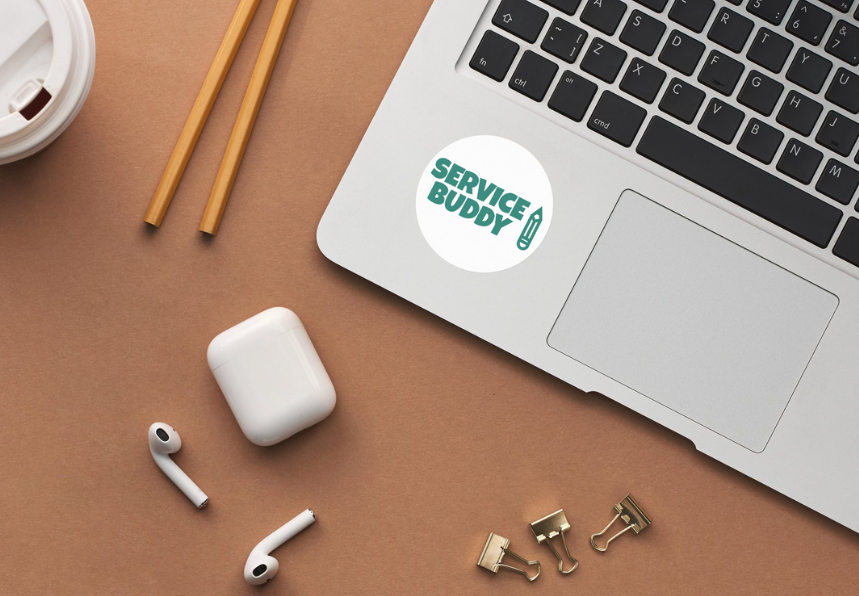Start a Flooring Business in 4 Simple Steps
Learn the four essential steps to start a successful flooring business, from planning and branding to operations and customer acquisition strategies.

Introduction
Starting a flooring business offers a remarkable opportunity in a booming market, projected to reach $31.7 billion by 2025. Entrepreneurs can tap into this potential by following a structured approach that includes:
- Crafting a comprehensive business plan
- Implementing effective marketing strategies
Yet, amid the allure of this lucrative industry, numerous challenges arise. How can one navigate the complex legal requirements, establish a strong brand presence, and ensure sound financial management?
This guide explores the essential steps for success, equipping aspiring business owners with the knowledge they need to thrive in the competitive flooring sector. By understanding the landscape and preparing for the hurdles ahead, you can position yourself for success in this dynamic market.
Develop a Comprehensive Business Plan
To develop a comprehensive business plan for your flooring business in 2025, follow these essential steps:
-
Define Your Vision and Mission: Start by clearly articulating your business's objectives and the core values that will guide your operations. This foundational step sets the stage for your strategic direction.
-
Conduct Industry Research: Analyze the surface materials sector landscape. Identify your target audience segments—such as residential versus commercial clients—and assess your competitors. Understanding customer requirements and industry gaps is vital for effectively positioning your business. Notably, the flooring sector is projected to expand to around $31.7 billion in 2025, highlighting significant opportunities.
-
Outline Your Services: Specify the types of surfacing services you will offer, including installation, repair, or cleaning. Highlight any unique selling propositions that differentiate your offerings from competitors, such as eco-friendly solutions or customizable designs.
-
Set Goals and Objectives: Establish clear short-term and long-term goals, including revenue targets and customer acquisition metrics. For instance, the average revenue for flooring companies is projected to be around $31.7 billion in 2025, indicating substantial market potential.
-
Create an Operational Plan: Detail your day-to-day operations, including staffing requirements, equipment needs, and workflow processes. This plan should address specific operational challenges, such as job scheduling and inventory management.
-
Financial Projections: Include projected income statements, cash flow forecasts, and break-even analysis to demonstrate the financial viability of your enterprise. It's advisable to create detailed financial projections for at least the first three years and regularly assess financial performance against these projections to make informed adjustments.
-
Legal Compliance: Ensure that your enterprise adheres to all relevant regulations and licensing requirements. This phase is essential for establishing trust with clients and safeguarding your enterprise.
-
Examine and Modify: Consistently review your plan to adapt to shifts in the industry or your operational surroundings. This flexibility is vital in a competitive industry where trends and consumer preferences can change rapidly.
By following these steps on how to start a flooring business, you can create a solid plan that not only guides your operations but also positions your venture for success in a dynamic market.

Navigate Legal Requirements and Business Structure
To successfully navigate legal requirements and establish your flooring business structure, follow these essential steps:
-
Choose a Business Structure: Start by evaluating whether to operate as a sole proprietorship, partnership, LLC, or corporation. Each structure has unique implications for liability protection and tax obligations. For example, knowing how to start a flooring business as an LLC offers limited liability protection while allowing flexible taxation, making it a popular choice among flooring professionals.
-
Register Your Company: Complete the necessary paperwork with your state to legally register your company name and chosen structure. This step is crucial for establishing your company identity and ensuring adherence to state regulations. Remember, 86% of consumers read online reviews before making a purchase, so a strong brand identity can significantly enhance your reputation.
-
Obtain Necessary Licenses and Permits: Investigate local regulations to identify the specific licenses and permits needed for flooring installation in your area. Understanding how to start a flooring business requires compliance with these legal requirements to operate legally and avoid potential fines. Licensing may involve a general commercial license and a contractor’s license, depending on your state.
-
Understand Tax Obligations: Familiarize yourself with federal, state, and local tax requirements, including sales tax applicable to building materials and services. An effective tax strategy is essential for understanding how to start a flooring business, as it can greatly influence your company's profitability, with profit margins in this sector typically ranging from 20% to 45%.
-
Set Up Commercial Insurance: Protect your enterprise with suitable insurance coverage, such as general liability and workers' compensation. This protection is vital for mitigating risks associated with installations and ensuring financial stability. Additionally, securing funding is necessary for initial stock, office setup, and other expenses.
-
Consult a Legal Expert: Engage an attorney specializing in commercial law to ensure all legal aspects are thoroughly addressed. Their expertise can help you navigate intricate regulations and make informed choices regarding your company structure, ultimately establishing a strong foundation for your enterprise. Understanding local demand is also crucial for success in the flooring sector, especially when learning how to start a flooring business, as legal advice can provide valuable insights in this area.

Implement Effective Marketing Strategies to Attract Clients
To implement effective marketing strategies, follow these essential steps:
-
Identify Your Target Audience: Start by clearly defining your ideal customers. Analyze their demographics, preferences, and needs. Understanding your audience is crucial; tailored marketing efforts can significantly boost engagement and conversion rates.
-
Create a Strong Brand Identity: Develop a memorable brand that embodies your business values and resonates with your target audience. A strong brand identity fosters trust and recognition, which are essential for standing out in a competitive market.
-
Utilize Digital Marketing: Leverage social media, SEO, and email marketing to connect with potential clients. Engaging content that showcases your flooring expertise is crucial for those looking to understand how to start a flooring business and enhance visibility. Did you know that using an integrated approach in campaigns can yield an average of 50% more return on investment (ROI)? It’s vital to unify your marketing efforts across channels.
-
Network Locally: Attend industry events, join local professional organizations, and collaborate with other experts to build relationships and gain referrals. Engaging in community events, like home and garden shows, can significantly enhance brand visibility and establish your enterprise as a reliable local resource.
-
Offer Promotions and Discounts: Attract new clients by providing limited-time offers or discounts on services. This strategy creates urgency and encourages potential customers to take action.
-
Collect and Showcase Testimonials: Encourage satisfied customers to leave reviews and testimonials. Displaying high ratings, such as '4.8 stars on Google,' can significantly enhance your credibility. Additionally, remember to show certifications and insurance, and prominently display authentic reviews. These trust-building elements are crucial in flooring advertising.

Establish Financial Management and Budgeting Practices
To establish effective financial management and budgeting practices, follow these essential steps:
-
Set Up a Business Bank Account: Keeping your personal and business finances separate simplifies accounting and tax preparation. This foundational step is crucial for maintaining clarity in your financial dealings.
-
Implement Accounting Software: Utilizing accounting software allows you to track income and expenses efficiently while generating financial reports. This not only helps you monitor your financial health but also provides insights that can drive your business decisions.
-
Create a Budget: Developing a detailed budget that outlines expected income and expenses is vital. Regularly reviewing and adjusting this budget ensures that you stay on track and can adapt to any changes in your financial landscape.
-
Monitor Cash Flow: Keeping a close eye on cash flow is essential. It ensures you have enough liquidity to cover operational costs and unexpected expenses, safeguarding your business against financial strain.
-
Plan for Taxes: Setting aside funds for tax obligations is a smart move. Consulting with a tax professional can help you optimize your tax strategy, ensuring you’re prepared when tax season arrives.
-
Review Financial Performance Regularly: Conducting regular financial reviews allows you to assess your performance against your budget. This practice not only highlights areas for improvement but also reinforces your financial strategy.
By implementing these steps, you can enhance your financial management practices, paving the way for a more successful and sustainable business.

Conclusion
Starting a flooring business demands a strategic approach that encompasses several essential elements. At its core lies a comprehensive business plan, which should:
- Define your vision
- Conduct thorough industry research
- Outline your services
- Establish clear operational and financial goals
Navigating legal requirements and selecting the right business structure are also vital steps that ensure compliance and protection for your enterprise.
Key insights from this guide emphasize the importance of effective marketing strategies to attract clients and the necessity of robust financial management practices. By:
- Identifying your target audience
- Creating a strong brand identity
- Leveraging digital marketing
Your flooring business can significantly enhance its visibility and client engagement. Moreover, implementing sound budgeting techniques and closely monitoring cash flow are crucial for sustaining financial health and making informed decisions.
In conclusion, embarking on the journey to establish a flooring business presents an exciting opportunity filled with potential. By following the outlined steps—from crafting a detailed business plan to executing effective marketing strategies and maintaining diligent financial oversight—you can position yourself for success in a competitive market. Embrace the process, stay adaptable, and seize the opportunities that arise in this thriving industry.
Frequently Asked Questions
What is the first step in developing a comprehensive business plan for a flooring business?
The first step is to define your vision and mission by clearly articulating your business's objectives and core values that will guide your operations.
Why is industry research important for a flooring business?
Industry research is important because it helps analyze the surface materials sector landscape, identify target audience segments, assess competitors, and understand customer requirements and industry gaps, which is vital for effectively positioning your business.
What types of services should be outlined in a flooring business plan?
The business plan should specify the types of surfacing services offered, such as installation, repair, or cleaning, and highlight unique selling propositions that differentiate the offerings from competitors, like eco-friendly solutions or customizable designs.
What should goals and objectives include in a flooring business plan?
Goals and objectives should include clear short-term and long-term targets, such as revenue goals and customer acquisition metrics.
What should an operational plan detail for a flooring business?
An operational plan should detail day-to-day operations, including staffing requirements, equipment needs, workflow processes, and address specific operational challenges like job scheduling and inventory management.
What financial information should be included in a flooring business plan?
The business plan should include projected income statements, cash flow forecasts, and break-even analysis to demonstrate financial viability, with detailed projections for at least the first three years.
Why is legal compliance important for a flooring business?
Legal compliance is essential to ensure that the enterprise adheres to all relevant regulations and licensing requirements, which helps establish trust with clients and safeguard the business.
How often should a flooring business plan be reviewed and modified?
The business plan should be consistently reviewed and modified to adapt to shifts in the industry or operational surroundings, ensuring flexibility in a competitive market.
List of Sources
- Develop a Comprehensive Business Plan
- blog.servicebuddy.io (https://blog.servicebuddy.io/5-steps-to-create-your-flooring-business-plan-effectively)
- growthteams.com (https://growthteams.com/grow-flooring-business-2025)
- ibisworld.com (https://ibisworld.com/united-states/industry/flooring-installers/196)
- Scoring flooring: Industry stats for 2024 - Floor Covering News (https://fcnews.net/2025/06/scoring-flooring-industry-stats-for-2024)
- Navigate Legal Requirements and Business Structure
- lightspeedhq.com (https://lightspeedhq.com/blog/how-to-start-a-flooring-business)
- zenbusiness.com (https://zenbusiness.com/start-flooring-business)
- blog.servicebuddy.io (https://blog.servicebuddy.io/10-samples-of-quotes-for-flooring-services-to-boost-efficiency)
- neliganlaw.com (https://neliganlaw.com/case_studies/bag-n-baggage)
- MNT Halan - Financial Inclusion - DPI (https://dpi-llp.com/case_studies/case-study-9-impact-theme)
- Implement Effective Marketing Strategies to Attract Clients
- Marketing Statistics: 100+ Insights for 2025 (https://salesforce.com/marketing/marketing-statistics)
- growthteams.com (https://growthteams.com/grow-flooring-business-2025)
- dolead.com (https://dolead.com/growth-hub/flooring-advertising-ideas-winning-strategies-for-2025)
- 55 marketing statistics you want to know for 2025 planning (https://optimizely.com/insights/blog/marketing-statistics)
- floortrendsmag.com (https://floortrendsmag.com/articles/113079-digital-marketing-reshapes-flooring-retail-success-strategies)
- Establish Financial Management and Budgeting Practices
- 40 Inspiring Quotes About Business Growth — and Tips for Success (https://salesforce.com/blog/inspirational-business-quotes)
- ardmac.com (https://ardmac.com/case_studies/lockton-insurance-brokers-ireland)
See Service Buddy in action with a live demo
Everything you need to run your flooring business, Service Buddy is your all-in-one management platform.



.svg)
